 Harmony Holiday
Harmony Holiday
In a new live album, protest music that proves the regenerative power of naming and withholding names.
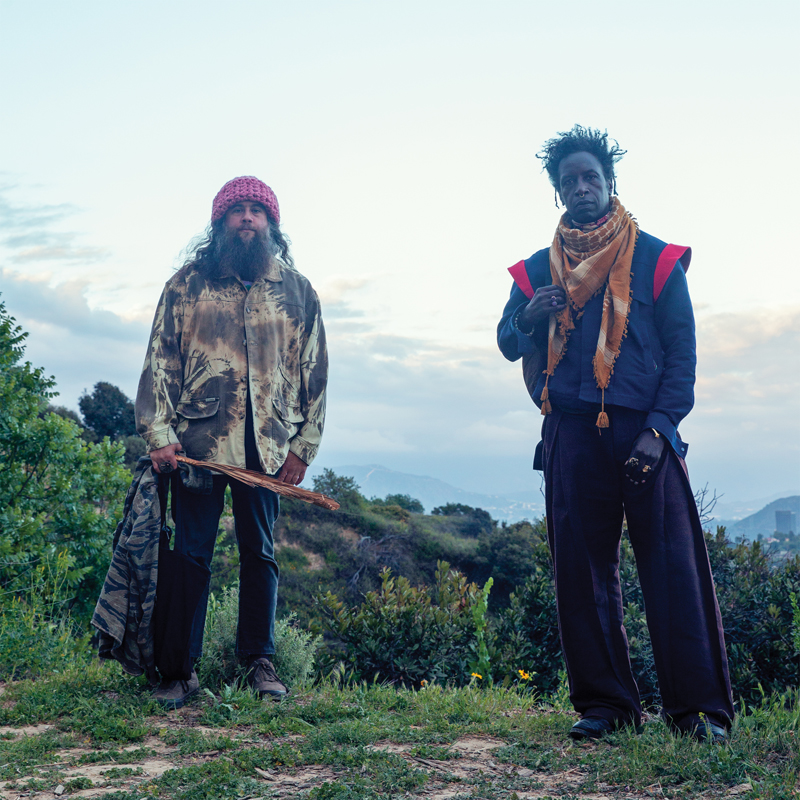
Saul Williams meets Carlos Niño & Friends at TreePeople, by Saul Williams and Carlos Niño & Friends, International Anthem
• • •
Live albums work best as invocations, ceremonies that give you the sense of having been there for the recording, not as if you were eavesdropping or lurking outside locked gates, but as if you were there when it was made in flesh and resonance, at the live birth of a recurring dream. You had to be there becomes remember when we were there together in the antique future of every consecutive current. This is the effect poet Saul Williams and percussionist and producer Carlos Niño transmit with their new offering, Saul Williams meets Carlos Niño & Friends at TreePeople. The title alone intimates no-frills folk revivalism, animism channeled through that grounded psychedelia of old-Hollywood hippie adjacency that is the more charitable side of the otherwise Lynchian-gothic Mulholland Drive, where the concert was held and recorded at a venue nestled in a protected near-sanctuary of a forest in Coldwater Canyon, deemed TreePeople in 1973 by an idealistic local teenager and maintained as such since. We receive that glamoured, rugged-edge feeling here as if trespassing on the final film lot in the final empire, in Saul’s forensic spoken account of the path we’ve traveled from genocide and slave markets to so-called free markets and finance capitalism, and back, in a harness that unfolds us to stagger as map and searchlight across the poems and their echoic accompaniment until he corrupts his own system to simulate the fall and final notes of theirs—I’ve seen enough.
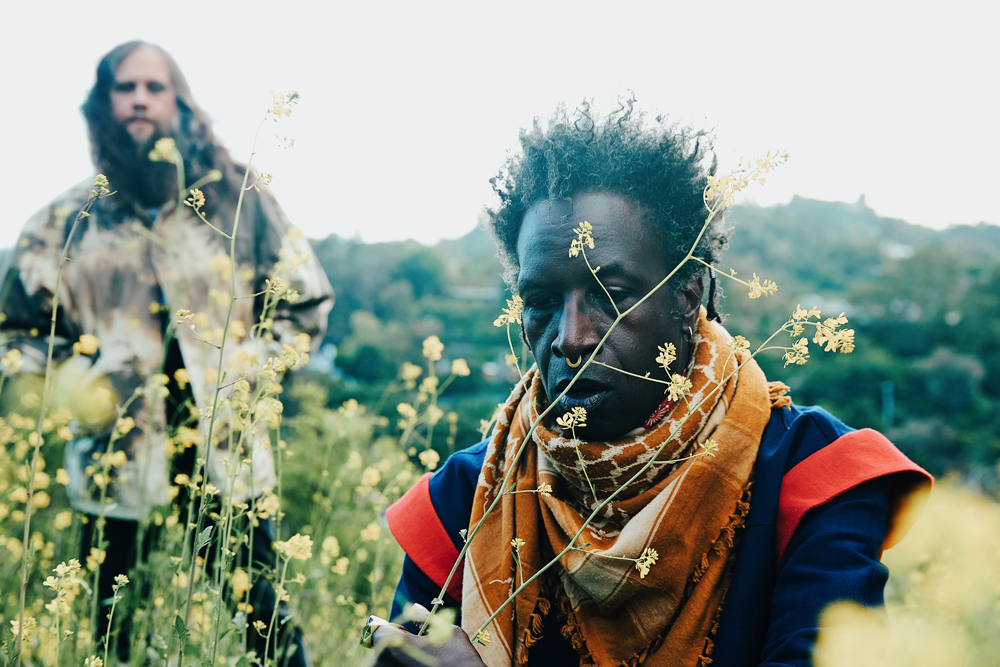
Carlos Niño and Saul Williams. Photo: Todd Weaver.
It’s true, we’ve been violated by the false ethics of empire, which is what Saul announces he’s seen enough of. The enough is too much, it’s oppressive, soul-shattering to see so much and be so overseen. It’s our souls Saul’s poetics hope to shepherd into a new or reclaimed land where seeing and suffering aren’t identical experiences, and this doesn’t mean we’ve gone into stupors of disembodied hipness that allow us to objectify what we see until it can be sewn into a litany of fetishes and remarks, a stoic or stunned audit with no call to action. Land back is therefore the first phrase of the provocation, repeated thrice as spell, into soul of my soul, half-whispered. This is not imitation beat poetry; we are the road here, hacked yet paving it with this pavane as we reconstitute it to travel it, as it intrudes and trades us for artifice and pseudo-folklore. The unity of deed and word paradoxically turns the sounds on this album exilic and places it in intentional solidarity with people under siege, instructing, distinguish a victim, to remind that concerned Americans are not the victims of the era, but are equipped and obliged to testify alongside them, on borrowed time, in borrowed tongues. The ensemble, a spectral octet that installs its own nervous system in the space, responds with the textures, hoots, spirals, and suspenseful minimalism with which you might expect the land itself to answer, a clamor into the sunset, hissing, applauding, making space for the next advance, a new version of a territory band, where here that means one that has assembled to decolonize itself.
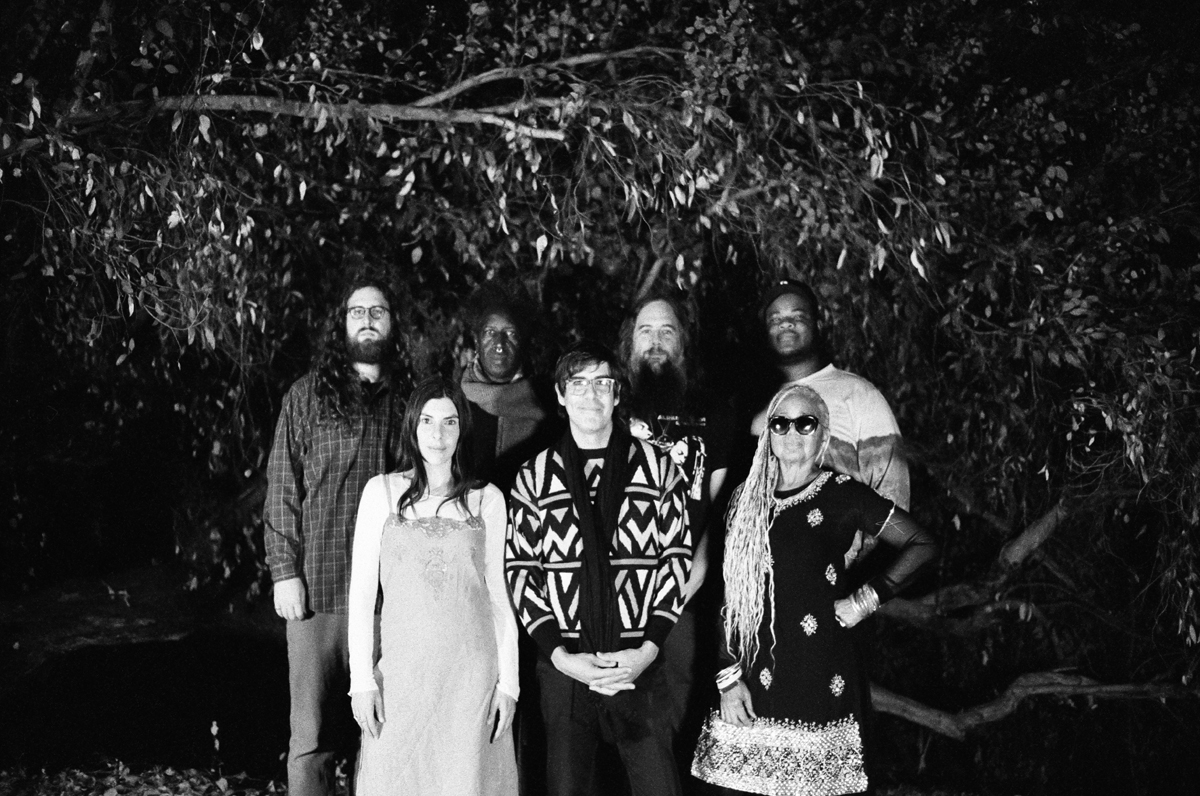
Saul Williams and Carlos Niño (center, back row) with ensemble. Photo: Sam Lee.
Of all the living American poets whose voices carry into spheres far beyond the page, Saul Williams has been one of the most, if not the most, obdurately vocal in decrying the cataclysm that began with October 7, 2023 and has devolved into genocide, famine, ethnic cleansing, annihilation, and the incremental erosion of truth in spoken and written language across all media, in the service of pro-Israel rhetoric or total denialism of the ongoing crisis. Daily, ritualistically, Saul uses his online and real-life platforms to circulate the stories and most urgent needs of people in Gaza, approaching the subject with tenderness, dignified rage, and an unwavering, undistracted gaze, to the extent that, when I search this album on streaming platforms, it doesn’t seem to stick to the digital memory machine, as if he might be shadow-banned by back-end minions. When I interviewed him in the late spring and asked if he felt it dangerous to remain so vociferous about the systematic destruction of the Gaza Strip and its civilian inhabitants, his answer was, it’s only dangerous when we’re silent voyeurs of his example, watching him speak, fellow poets letting him shoulder the risk alone as if the poet’s job under technocracy were to decorate the state with the idea of creative freedom without bothering to test its practical applications until it inevitably malfunctions and becomes the softhearted fascism of liberal good intentions we have today. This album as artifact is proof that it’s those who traffic in opportunistic silence—when, as Saul points out in the album’s closing statement, we have a special responsibility because we are within the belly of the beast—who are in the most danger; having no community, nothing they stand for unequivocally, there will be no one willing to go into the forest and hear them sing and this will be justice for the judgmental and too-careful careerists most of us have become under the American regime. Why should we trust your verses when you cannot be trusted with the truth?
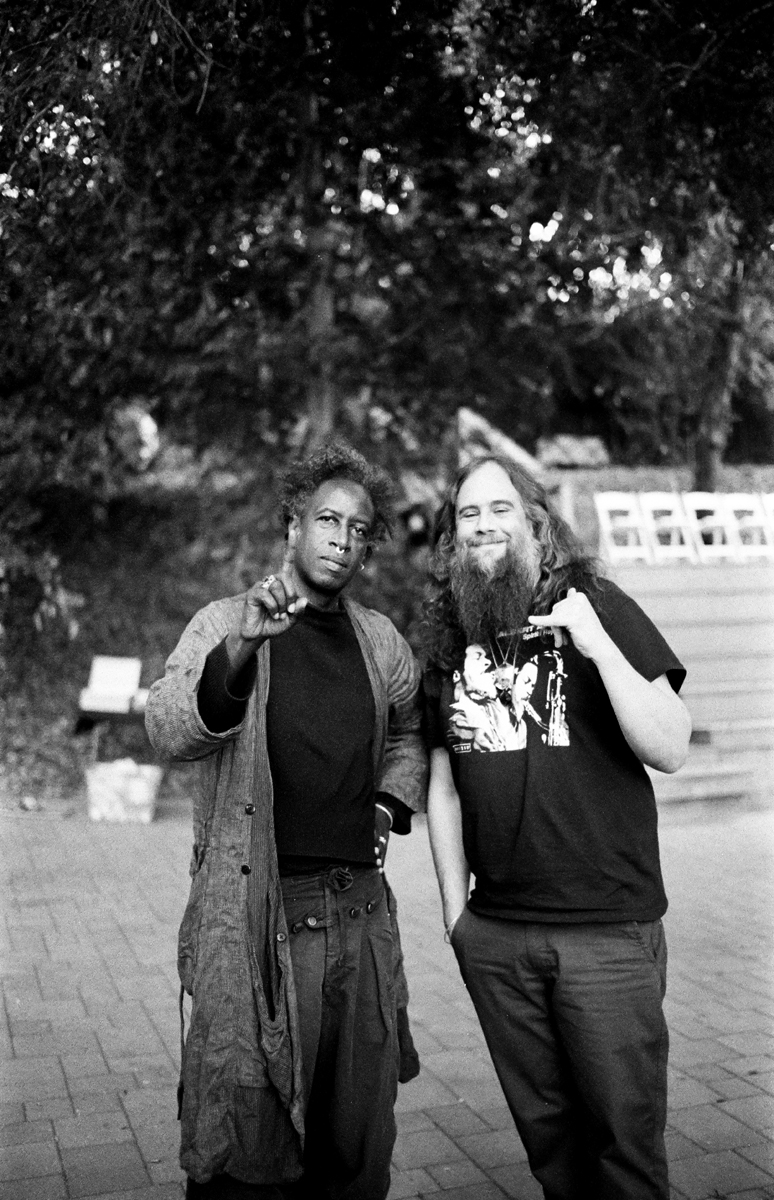
Saul Williams and Carlos Niño. Photo: Sam Lee.
Why can’t you trade your fake paradise for a real adventure? The album answers, with mockingbird optimism, everything is positioned right where it needs to be; the clowns are positioned right where they need to be. And against them we go hacking into our own motherboard, laughing at their forced laughter, making euphemism unbearable for them, romancing the terror out of its skin, sullen, unbroken, it was an impossible moment, there was no way out of it, we lifted our voice and it was lost in the wind, the poem swings, despairingly while the wind instruments giggle with evil counter-will, the mirth of surrender, amidst the torrents of beauty, another bomb dropped, right now—look what they did to the land, look what they did to the people. An oral history of this breaking point where we find ourselves gathered to mend comes forth as weapon, and Saul extends a form he pioneered, the overlaying of monologue or soliloquy and recited poem into testimony that hacks deeper into the collective consciousness every time you hear it because it comes from his body as stored knowing, it finds its way back to yours, and reveals the world the body occupies.
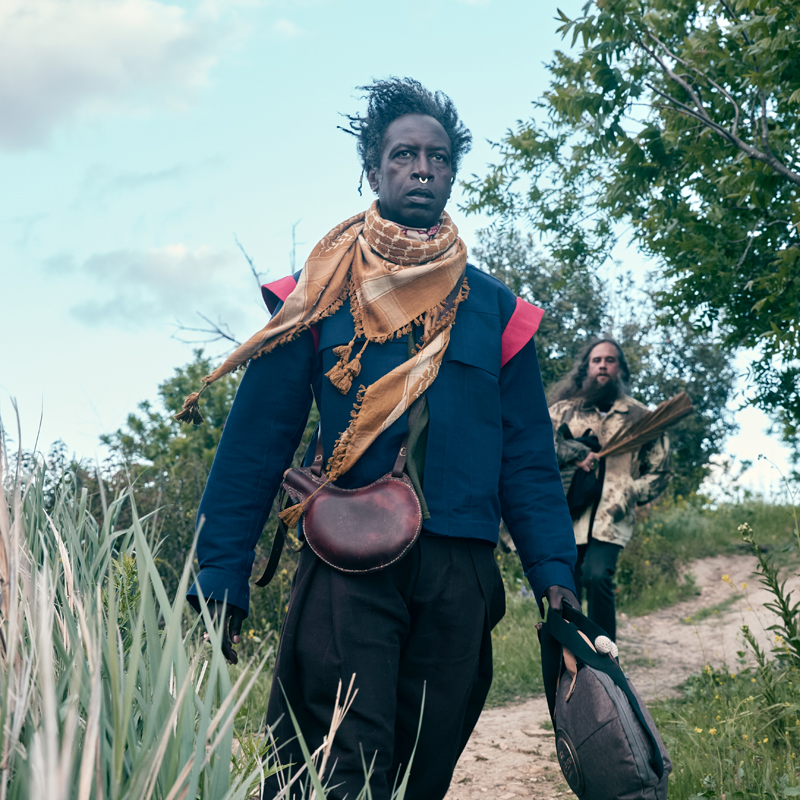
Saul Williams and Carlos Niño. Photo: Todd Weaver.
Rather than naming the current predators, which would be too easy and expected, on “We are calling out in this moment . . . ,” Saul escorts us back to primitive Manhattan, where land stolen from the Lenape people became impetus to build a wall enclosing a market where you could rent slaves and provisions, trade, make civilization. The enclave became what we now know as Wall Street, the Stock Exchange, the treacherous house of worship holding our economy together and empowering replicas in distant lands, in Gaza, in Sudan, where resources yet-to-be extracted are enough to inspire pathetic walls, implacable genocidal will, a massacre reverberating with the same hubris that gave us Wall Street, Manhattan, that city as glad-handing atrocity for which we all love to suffer. The silent prediction being that what they’ve accomplished here they will try there. This album joins 1974’s Sahel Concert at Town Hall for which Roy Brooks and the Artistic Truth gathered to speak against the drought and famine in the region, and created an original jazz album documenting an ongoing catastrophe. Saul, Carlos, and friends have managed to embroider real agony with insight and beauty that forces agony to recede for the duration of the album, proving the regenerative power of naming and withholding names. I’ve been complaining about the disappearance of protest music for the past couple of years; now we have some appropriate for the time, impossible to sing along to, impossible to disregard. Once you hear it, you have been implicated in building the walls of your own prison metropolis with silence.
Harmony Holiday is the author of several collections of poetry and numerous essays on music and culture. Her collection Maafa came out in April 2022, and the extended UK edition was released April 2025.